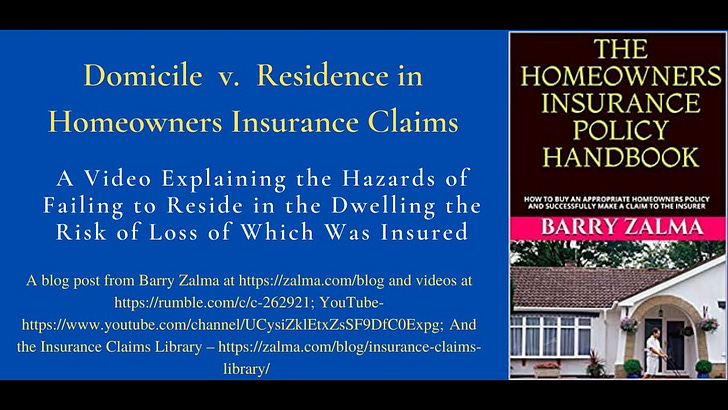A Video Explaining the Hazards of Failing to Reside in the Dwelling the Risk of Loss of Which Was Insured
Domicile v. Residence in Homeowners Insurance Claims
Read the full article at https://www.linkedin.com/pulse/domicile-v-residence-homeowners-insurance-claims-zalma-esq-cfe and see the full video at https://rumble.com/c/c-262921 and at
and at https://zalma.com/blog plus more than 3800 posts.
Insurance companies often see disputes relating to the terms “domicile” and “residence” when dealing with a homeowners policy. It is important, therefore, that everyone in the business of insurance must understand the meaning, and application, of the terms to insurance claims and how they relate to individuals and corporations that are insured or insurers.
Although a person may have more than one residence, he or she may only have one domicile at any one time. [Nat’l Artists Mgmt. Co. v. Weaving, 769 F. Supp. 1224, 1227 (S.D.N.Y. 1991)].
The controlling factor in determining residency, on the other hand, is intent, as evidenced primarily by the acts, of the person whose residence is questioned. [Farmers Auto Insurance Ass’n v. Williams, 213 Ill. App. 3d 310, 314 (2001), Direct Auto Ins. Co. v. Grigsby, 2020 IL App (1st) 182642-U (Ill. App. 2020).]
In the context of automobile insurance exclusions, residence is determined on a case-by-case basis using factors such as intent and relative permanence. [Potter v. State Farm Mut. Auto. Ins. Co., 996 P.2d 781, 783 (Colo. App. 2000); Grippin v. State Farm Mut. Auto. Ins. Co., 409 P.3d 529 (Colo. App. 2016)]
In Holland v Trinity Health Care Corp, 287 Mich App 524, 527-528; 791 NW2d 724 (2010) the Court defined the verb “reside” as to dwell permanently or for a considerable time, to live. In doing so, the Court expressly explained that the definition of “reside” is not synonymous with the legal definition of “domicile,” which may have a more technical meaning than intended in the home insurance context under the policy language at issue. The term “reside” requires that the insured actually live at the property.
The homeowners policy language unambiguously requires that the property at issue be the insured’s “residence premises” for coverage to apply. It does not require that the property be the Insured’s domicile.
© 2021 – Barry Zalma Barry Zalma, Esq., CFE, now limits his practice to service as an insurance consultant specializing in insurance coverage, insurance claims handling, insurance bad faith and insurance fraud almost equally for insurers and policyholders.
He also serves as an arbitrator or mediator for insurance related disputes. He practiced law in California for more than 44 years as an insurance coverage and claims handling lawyer and more than 54 years in the insurance business.
He is available at http://www.zalma.com and zalma@zalma.com. Mr. Zalma is the first recipient of the first annual Claims Magazine/ACE Legend Award. Over the last 53 years Barry Zalma has dedicated his life to insurance, insurance claims and the need to defeat insurance fraud. He has created the following library of books and other materials to make it possible for insurers and their claims staff to become insurance claims professionals.
Go to the podcast Zalma On Insurance at https://anchor.fm/barry-zalma; Follow Mr. Zalma on Twitter at https://twitter.com/bzalma; Go to Barry Zalma videos at Rumble.com at https://rumble.com/c/c-262921; Go to Barry Zalma on YouTube- https://www.youtube.com/channel/UCysiZklEtxZsSF9DfC0Expg; Go to the Insurance Claims Library – https://zalma.com/blog/insurance-claims-library/ Read posts from Barry Zalma at https://parler.com/profile/Zalma/posts; and the last two issues of ZIFL at https://zalma.com/zalmas-insurance-fraud-letter-2/ podcast now available at https://podcasts.apple.com/us/podcast/zalma-on-insurance/id1509583809?uo=4
The “insured location” was defined in relevant part to mean “the residence premises,” and the “residence premises” was defined to mean the dwelling where the insureds “reside and which is shown as the ‘residence premises’ in the Declarations.” Faced with such clear and unambiguous language, a court is required to enforce the exact language of the policy that unambiguously required the insured to reside at the insured premises at the time of the loss. If the insured resided in a different location there could be no coverage.






